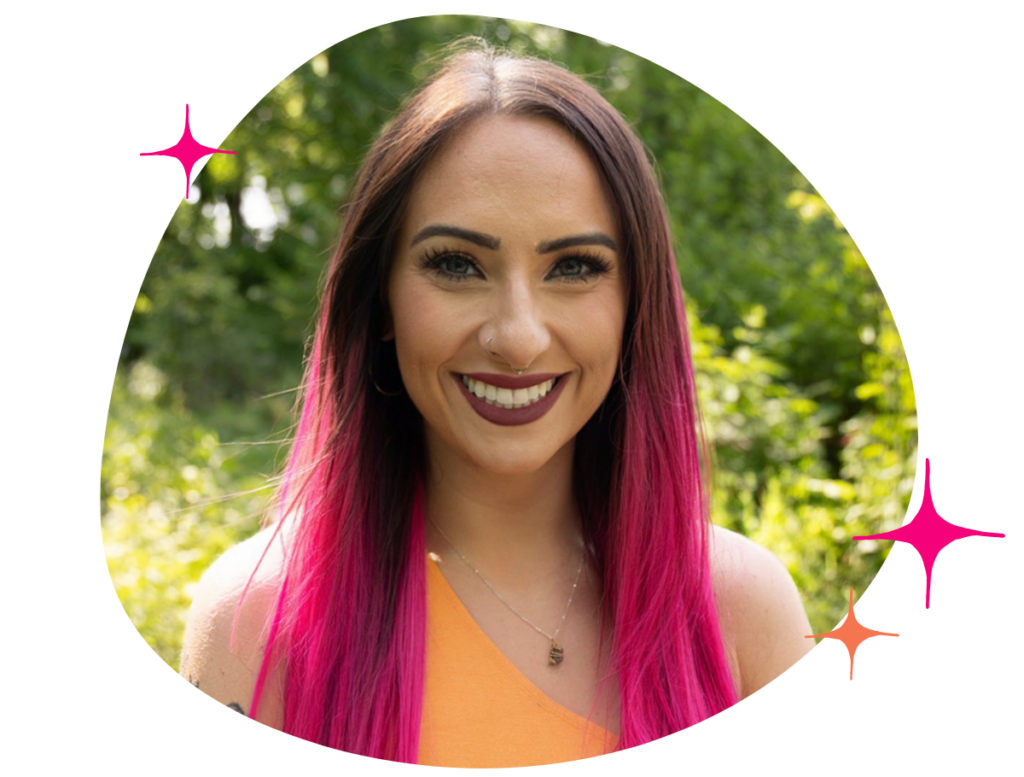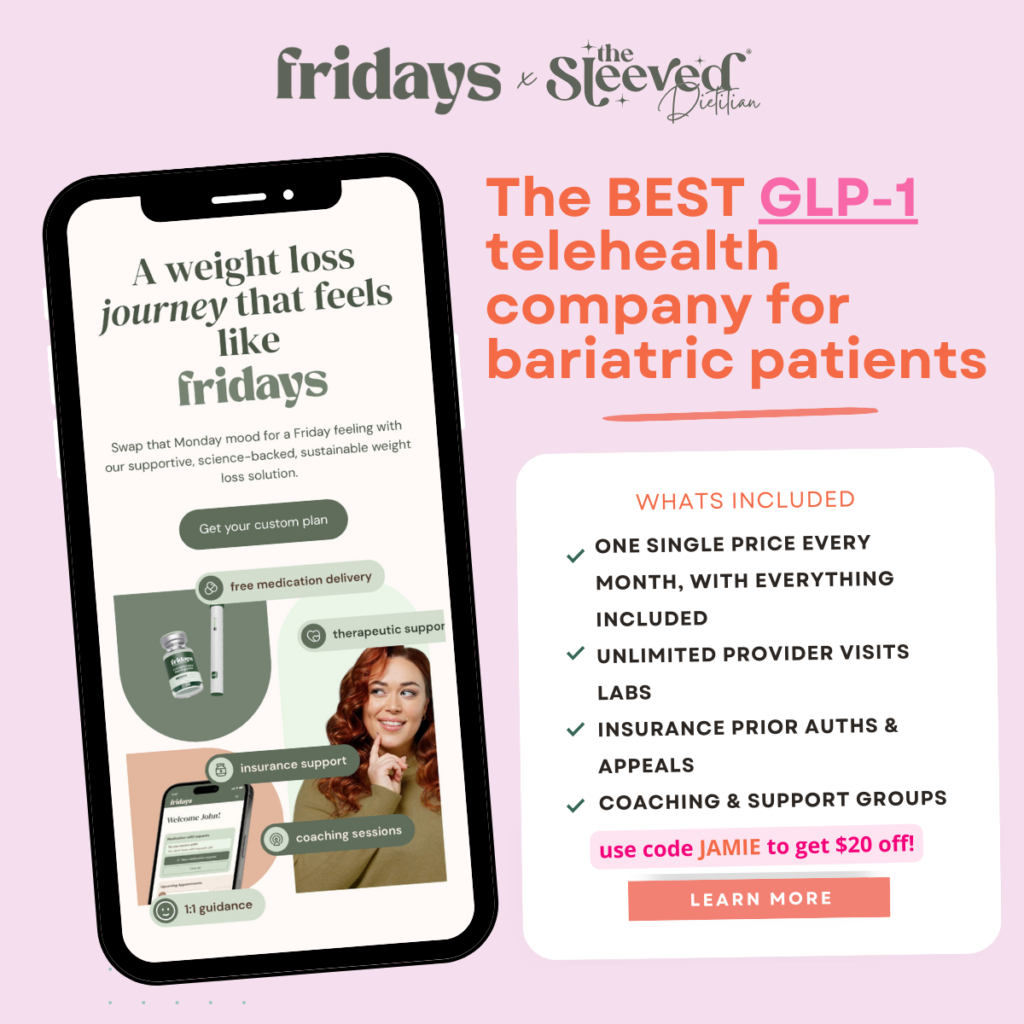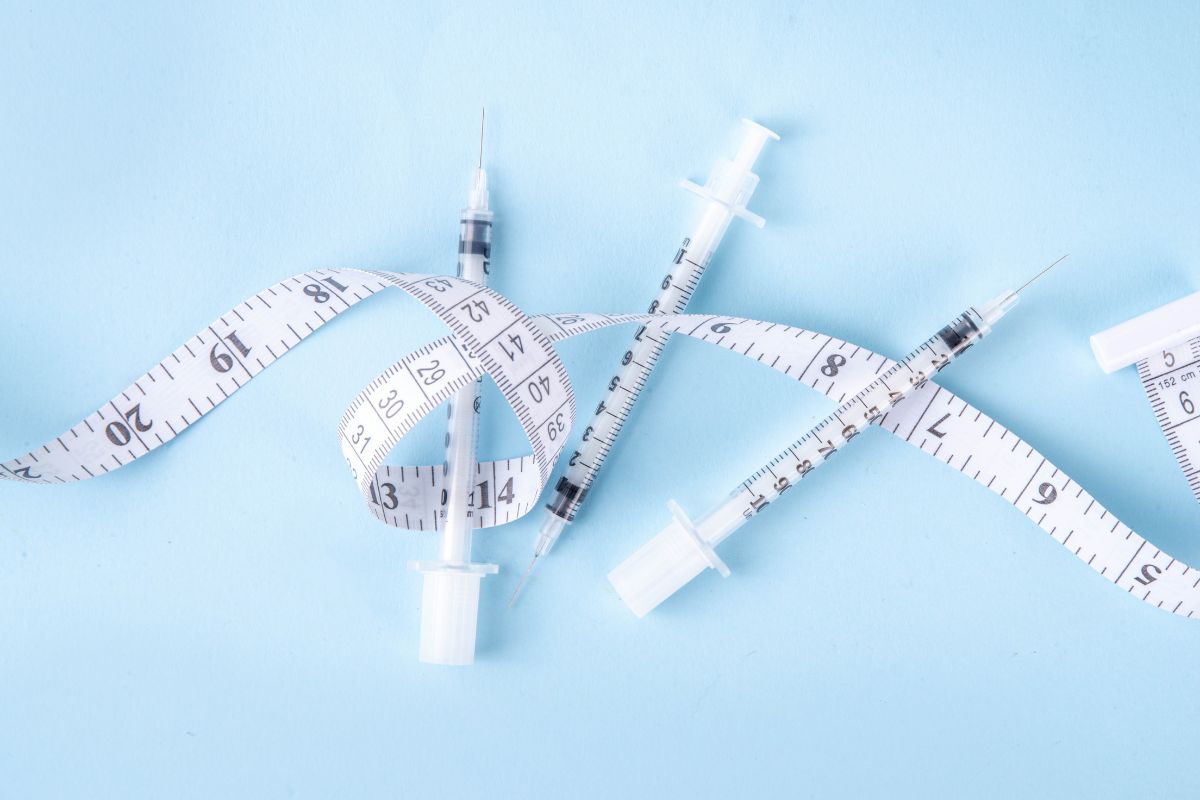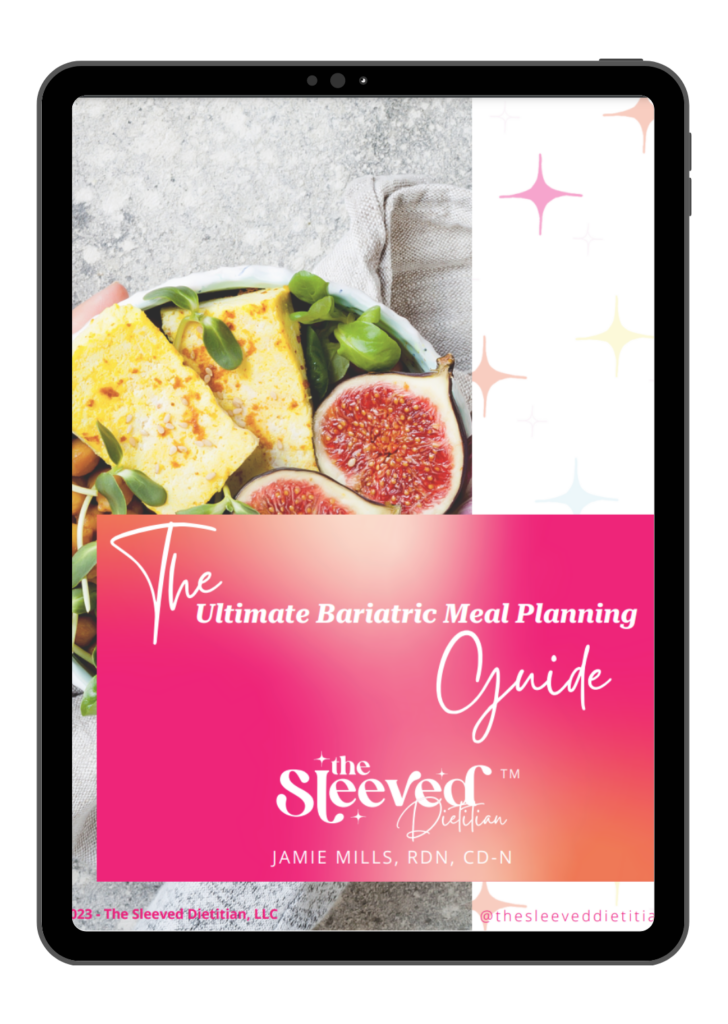All kinds of weight loss surgery might come with an unexpected (and definitely unwanted) side effect: hair loss.
It is really common to experience some hair loss and thinning after weight-loss surgery, there are ways to minimize this potential issue and to nourish your hair’s ability to grow back (hint: nutrition is your superpower!).
In this blog post, we’ll explore the causes of post-surgery hair loss, no matter which kind of weight-loss surgery you pursue, and what you can do to keep your locks looking as healthy and lustrous as possible. So read on for everything you need to know about hair loss after gastric sleeve surgery!
Babe, are you new here? Welcome, my name is Jamie. I am both a registered dietitian AND a bariatric patient. My team and I run The T.R.I.B.E., your one-stop shop for all things nutrition and wellness with weight loss surgery and beyond. From evidence-based, practical knowledge to support and accountability, we’re here to empower your weight loss journey.
Let’s start this blog with why we might lose our hair, to begin with. Then, we’ll talk about prevention and confidence-boosting solutions.

Why do we lose our hair after gastric sleeve?
About three months after surgery, about 75% of people will start to lose their hair (1).
While it can be alarming to lose hair in large amounts, this hair loss after weight loss surgery is usually temporary. Why does it happen?
Stress…all kinds!
After your surgery, your body is working to heal and recover. This is a big project for your body and like any big project, it is stressful! The stress on your body as you recover from surgery can last for a few months…and this stress can cause hair loss (2).
You’re eating less
You’re also not able to eat as much after surgery (duh!). With fewer nutrition resources available, your body will have to triage what systems in your body get first dibs on what you are able to eat. And sorry Goldilocks: healing and repair gets priority over your hair.
You’re not absorbing as much
If you have a Duodenal switch surgery (DS) or a Roux-en-Y (RNY) gastric surgery, your digestive tract is different, and not able to absorb as much nutrition as before. While this is helpful for weight loss, it does make it even harder for your body to get all of the nutrients to thrive on a daily basis. This can impact your hair in a big way.
So while it may not be 100% possible to prevent hair loss, what can you do to minimize it?
How to stop hair loss after gastric sleeve?
Hair loss can be an extremely distressing concern for many people, but luckily there are a few things you can do to help reduce how much it happens.
Your new habits after your weight loss surgery will help you not only to heal and make progress towards your goal of weight loss: the right nutrition on a consistent basis can help to minimize your hair loss.
But take note: I said “minimize” not “eliminate.
Hair loss is a pretty typical part of the process, even if you’re following your eating guidelines to a T. So, if you are experiencing some hair loss, please don’t feel like this is your fault or that you’ve done something wrong.
Let’s start with the foundation: protein!
Prioritize your protein
If you ever get sick of me saying something on repeat, it is going to be talking about protein. But I’m not going to stop educating about protein: it is just that important.
Each day, you want to eat a minimum of 60 to 80 grams of protein (3). Ideally, you’re spreading your protein foods throughout the day, vs. trying to consume all of your protein grams at a single meal.
At each meal, you want to eat your protein first. Since your stomach is not able to hold nearly as much as before you had surgery, it is important to get this top-priority food in before anything else.
If you’re a vegetarian, you might need a bit more protein on a daily basis, because plant-based protein is not complete (like collagen). Work with your nutrition team to find the right amount of vegetarian protein to meet your needs.
What about Collagen? If you enjoy having collagen as a part of your routine, you’re welcome to do so. Just don’t count those grams of protein from the collagen towards your daily tally. Collagen is NOT a complete protein and so doesn’t have quite the same potential to help your body as fully complete protein does (4).
Eggs, chicken, steak, pork, and tofu are all examples of complete protein, BTW. Collagen is not.
Take your supplements
Each day, you’re going to want to be consistent with taking your vitamins and minerals. Your body needs to have access to high-quality supplements in order to have the nutrients it needs.
So, not any vitamin will do: I recommend looking for bariatric-specific supplements. One example is ProCare Health. Not only are ProCare supplements designed by registered dietitians to meet the unique needs of bariatric babes like you, but their supplements are also 3rd party tested to ensure that they’re of high quality (5). Win!
The right vitamin supplement for you will be gentle on your stomach and provide your body with the right mixture of absorbable nutrients that support your health…and your hair! This includes iron, vitamin A and vitamin D…and a whole lot more (6). The dose needs to be enough, but not too much.
This can be personal, so be sure to get into the fine print with your weight loss healthcare team, especially your dietitian.
Extra supplements may or may not help…
I see it a lot where bariatric patients are trying to minimize their hair loss by taking a LOT of supplements (biotin! collagen! vitamins!) without starting with the protein foundation.
Babes, this is kind of like having a roof on your house but not walls…you cannot skip the basics.
And here’s the tough news: biotin may or may not actually help (7). The studies about biotin don’t always agree that it has a clear benefit.
And as I mentioned earlier, collagen can be OK to have as a supplement, but it cannot replace the foundational 60-80 grams of complete protein that your body needs each and every day at your meals.
And like Goldilocks, your locks need enough but not too much of any one thing. It is possible to overdo it with supplements. For example, if you have too much selenium, you can cause additional hair loss – yikes (8).
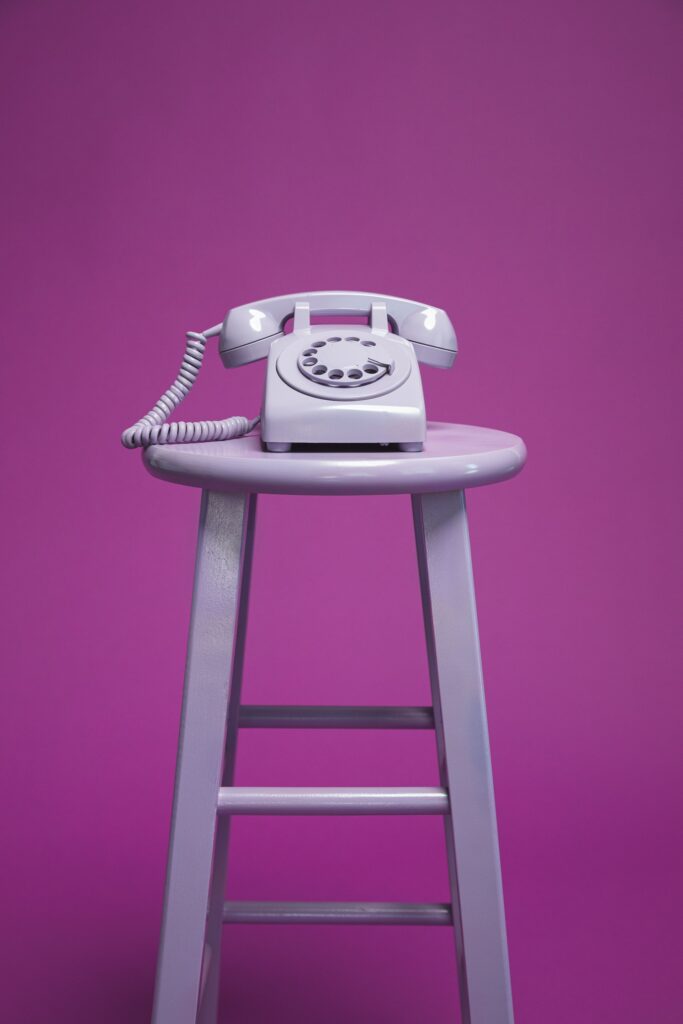
If you are concerned about hair loss, talk to your surgical team and registered dietitian about your options
When dealing with hair loss, it’s important to not just accept what is happening. Talk to your surgical team and registered dietitian about available options so that you can take the best course of action for your specific situation.
Ask questions and make sure that you get reliable information that you can use in order to make an informed decision on the steps to take next. Taking control of your situation is the first step towards a healthier head of hair.
How long does hair loss last after gastric sleeve surgery?
Experiencing hair loss can be highly distressing and worrying, but it’s important to remember that in many cases the condition is usually only temporary.
It is normal to experience some degree of shedding, especially after surgery, usually starting a few months after your surgery. With a protein-forward diet and regularly taking your vitamin and mineral supplements, the dense luscious locks you may have once had will likely return about a year later.
Hair loss should be expected. Even though it kind of stinks, I encourage you to not have hair loss worries stop you from pursuing weight loss surgery.
Anything else I can do?
In the meantime, there are some options to help boost your confidence while your hair is coming back.
One option is to use hair extensions, or fillers, or to wear a wig. You might even use this as an invitation to try a new fun color (pink, anyone?) for a bold pop of color. Just make sure that you’re having open conversations with your hairdresser before adding extensions; if you’re actively losing hair, they may not recommend extensions just yet.
Another option is to consider a shorter cut. With less weight on your hair, a shorter cut can create the illusion of fuller hair.
No matter your hair length, you can also use products to help your hair to appear more full. Toppik is a powdered product that you can sprinkle at the roots of your hair and have your hair look more full. It comes in nine shades so you can find the right color for your beautiful hair.
Don’t be embarrassed or ashamed to use tools to make you feel more comfortable with what your hair is doing right now. You deserve a confidence boost, Babe!
How I can help
Although hair loss is a common side effect of gastric sleeve surgery, there are things you can do to prevent or minimize it. Taking vitamins and eating a healthy diet (prioritize your protein!!) are two important things you can do to help your body recover from surgery and keep your hair healthy.
If you are concerned about hair loss, talk to your doctor or surgeon about your options. Remember that hair loss is usually only temporary and will not affect your long-term health or appearance. But I also know that hair loss can feel really, really hard.
When you struggle with your weight, a lot of us hide behind our hair. For much of my life, my long, thick hair was the only thing that made me feel beautiful. So losing a lot of it after my weight loss surgery felt devastating.
It is SO important to have a support community of people who truly get it. All of it. Even the pain of hair loss!. Join the T.R.I.B.E today for more tips on how to cope with hair loss after gastric sleeve surgery…and how to thrive in your new bariatric life!

